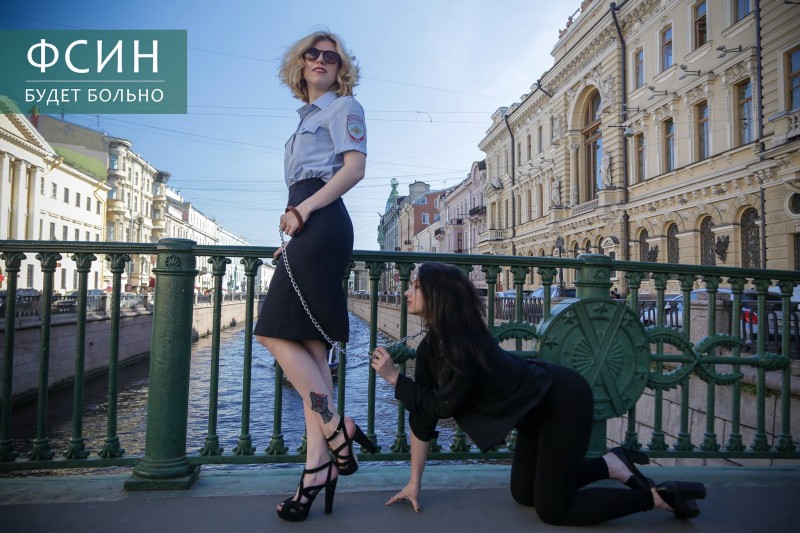
Polina Nemirovsky (left) and Olga Borisova (right), June 2, 2015. St. Petersburg, Russia. Photo: Facebook. Caption reads, “The Federal Penitentiary Service—it’s gonna hurt.”
Russian opposition activists are livid about the bill, staging a series of small demonstrations to try to raise awareness, though the public’s attention lately has been better fixed on the government’s efforts to legislate out of existence “undesirable organizations” and “foreign agents.”
The Old Guard demonstrates
On May 29, two days after the bill was introduced to the Duma, a handful of Russia’s oldest human-rights activists staged parallel single-person pickets outside the parliament. Even 87-year-old Lyudmila Alexeyeva was on hand to hold up a sign that read, “I am against the ‘Sadists’ Law.”
The next week, on June 3, Alexeyeva appeared on the Russian independent television station TV Rain, where she vowed to use her newly resumed seat in a presidential advisory group to appeal to Putin and demand that he not sign the bill, should it reach his desk.
“I’m sure the law won’t be adopted,” Alexeyeva said, and then added with hesitation, “because, I don’t know, I will protest against it in all ways possible and impossible. I’ll start a hunger strike, for example.”
This is the New Guard

Polina Nemirovsky (left) and Olga Borisova (right), June 2, 2015. St. Petersburg, Russia. Photo: Facebook. Caption reads, “The Federal Penitentiary Service—it’s gonna hurt.”
The two women marched through St. Petersburg, stopping at a new photo exhibit sponsored by the city and dedicated to Russia’s success in the 2014 Sochi Olympics. The exhibit includes portraits of Russia’s Olympic champions, as well as an enormous picture of Vladimir Putin, including him among the country’s “Olympic heroes.” Borisova and Nemirovsky made sure to pose for a photograph in front of the President’s picture.
Borisova says she got the idea recently and contacted Andrei Pivovarov, the PRP-PARNAS co-chairman in St. Petersburg, who endorsed the concept. Next, Borisova enlisted her friend, Nemirovsky, who wrote the “it’s-gonna-hurt” slogan. The women say they were aware that not everyone would appreciate their sexualized treatment of the issue, but they say the only thing that matters is drawing more attention to the legislation. “Politics is rather boring for the average person, and we’re getting their attention with this photoshoot. As a result, people will take an interest in what this was all about,” Borisova told RuNet Echo.
Nemirovsky was similarly unapologetic, saying she doesn’t care how people attract attention to the “Sadists’ Law,” just so long as more people learn about it. “You can stand on the picket line, you can sign a petition, or you can do something like we did. These are all different and necessary sides of the same coin,” she wrote on Facebook.
The law
The legislation in question, Bill Number 802242-6, authorizes prison guards to use 13 different violent responses to inmates who threaten them or disobey prison rules: special clubs, special gases, handcuffs and other restraints, electroshock devices, photoshock devices, guard dogs, special devices that emit light and sound, restraints for transportation, immobilizing devices, water cannons, armored vehicles, blocking traffic, and tools for breaking through barriers.
Certain restrictions do apply, such as the necessity of the prison director’s permission before using water canons and armored vehicles, but using most of the other physical means is left to the discretion of the guards themselves. In the event that a prisoner is killed while being subjected to one of these restraints, the new legislation would grant prison authorities a full 24 hours before they were obligated to contact the police.
On June 5, the head of Russia’s Federal Penitentiary Service stated that the law is “nothing revolutionary,” saying it merely “clarifies the moments when a guard has the right to use physical force.”
According to Oksana Trufanova, a human-rights observer in Chelyabinsk, Russian prison authorities are backing the legislation financially, pushing it through the parliament in order to pass it and make it easier to earn money by torturing prisoners. “Torture is just a business. Give up your money, if you don’t want to be beaten up, if you want to be treated like a human being; give up you money, if you want to eat decent food. There is a huge corrupt component of the prison system,” Trufanova said recently. She also speculates that prison officials might be intentionally subjecting inmates to unbearable conditions, in order to provoke riots that would in turn seem to justify legislation like the “Sadists’ Law.”








3 comments